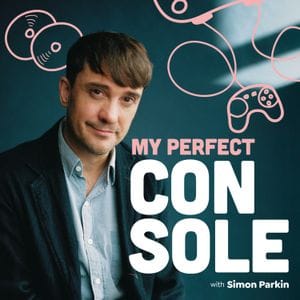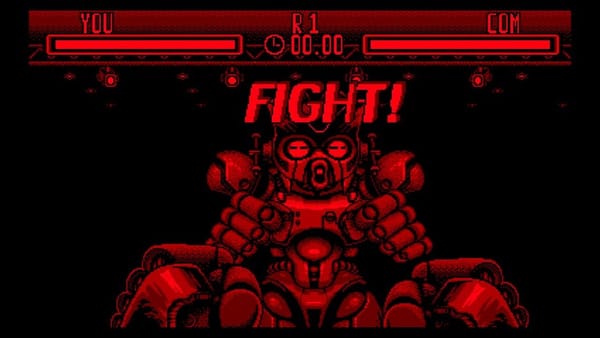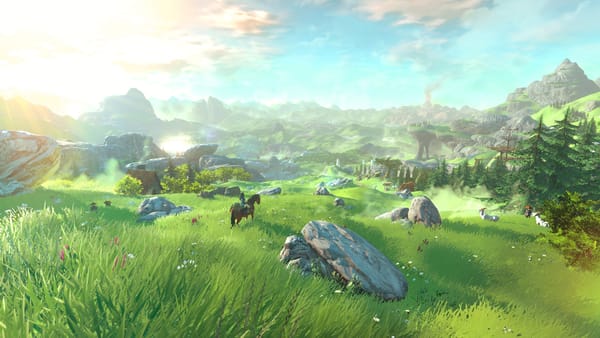#328: Perfection
Hit Points on a podcast? Again? Weird.

Hello! Forgive me for this brazenly promotional post, which I promise to make as editorially nourishing as possible. I am the guest this week on Simon Parkin’s wonderful podcast My Perfect Console, which over the last two-and-a-half years has asked a parade of game makers and public figures to immortalise their five favourite games on a fictional games machine. It has featured such estimable game-industry figures as Seamus Blackley, Bennett Foddy, Nolan Bushnell and Jordan Mechner; makers of some of my favourite games, like Maddy Thorson, Phil Fish, Greg Kasavin and Tetsuya Mizuguchi; and non-gaming luminaries including Ronan Farrow, Saraya Bevis, Bryan Lee O’Malley and Daniel Pemberton. This is exalted company, and I can only apologise for what I assume is a significant lowering of the tone, standards and reputation of the podcast now I've been on it too. In my defence, I’ve known Simon for years; he surely knew what he was getting himself into.
Anyway! I won’t spoil the details of my selection — both Simon and I would prefer you to put aside 90 minutes of your time and find out for yourself. But I thought I’d talk about the process a bit, primarily because it a) took ages and b) was absolutely agonising. I’ve been listening to MPC since the day the first episode came out, and in my quieter moments have idly wondered what my five games might be, in the unlikely event that Simon ever got bored of asking Pulitzer winners, industry legends and game-of-the-year-makers to come on the show and decided to ask me instead. I figured it would be pretty easy, actually, coming up with five games. I was, of course, horribly wrong.
While I spent my journo career in print, rather than online — and as such have less experience of list features than my web-based peers did, back in the day when every website wanted to be Buzzfeed — I’ve done enough of them in my time. We did the Edge Awards every year, arguing in meeting rooms over the precise placement of Banger X versus Beloved Sequel Y. We once did a Top 100 special edition that involved a number of tedious debates over how well, say, Game Boy Tetris really held up in 2015. Over the years I came to understand that the key to a successful list — particularly a ranked one — is the framing. More often than not, it’s a single adjective. Are we talking about the most influential games? The most important ones? If we’re looking for the ‘best’, are we talking about how well they stand up today, or how good they were when they were released? Good framing is the key to a good list, and absolutely vital to the process of putting one together without spending 14 hours locked in a meeting room with a bunch of people you will eventually hate.
My chosen adjective was ‘eternal’. I wanted a selection of games that I could happily sit down and play today, regardless of their age, and could see myself still playing in the nursing home. While Simon understandably isn’t too fond of the comparison, I couldn’t help but think of it in the terms of the BBC’s decades-old Desert Island Discs; if I was stranded somewhere remote, cut off entirely from the rest of the world — a notion which honestly sounds better with every passing day — and only had five games to last me a lifetime, what would they be?
That helped, I think, to a degree. The first four games were locked in within about thirty seconds; I was debating over the fifth for a month. My apologies to, among many others, God Hand, Puzzle & Dragons, Destiny, Dark Souls, Super Monkey Ball and Osu! Tatakae! Ouendan. I still love you with all my heart, but I couldn’t take you all. There just wasn’t enough room on the boat.
Anyway, check it out, if you have time. If you enjoy it, have a browse through the episode archives, where you’ll find some absolute crackers. (My personal favourites are Cabel Sasser, Phil Fish, and Meghna Jayanth.) If you really enjoy it, you should consider supporting the podcast on Patreon. (And maybe subscribe to Hit Points too, if you’re not already on board — there's a button for that below.) Indie media is hard, and is only getting harder; without the support of the people that enjoyed it, podcasts like MPC, and newsletters like Hit Points, will only be around for so long. Anyway! That’s enough nonsense from me. Catch you next time.





